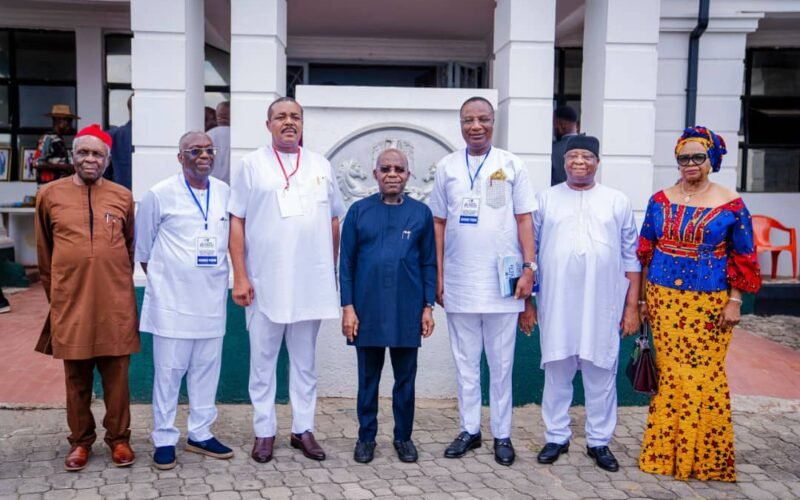The Ontology of Place and Utopia in Praxis: A Dialectic of Neglect and Renewal
**What does it mean to *be* a place? Abia State, under Governor Alex Otti, is no longer a mere geographic entity but a living testament to the interplay of philosophy and action. The Ontology of Place—the essence of a community’s identity—is being rewritten through roads like the Obehie-Owaza corridor, which transcend asphalt to become arteries of hope, reconnecting Ukwa’s marginalized soul to its latent potential. Simultaneously, Utopia in Praxis emerges not as a distant ideal but as daily governance: modular refineries rising from neglected soil, universities ascending national rankings, and security crackdowns that reclaim public trust. Yet this transformation is rooted in a Dialectic of Neglect and Renewal—a Hegelian clash where decades of abandonment collide with visionary leadership, birthing a synthesis of progress. Otti’s Abia challenges us to ask: Can infrastructure be existential? Can policy embody ethics? This article unravels how concrete roads, classrooms, and clinics become metaphors for a deeper rebirth—where place evolves from a passive backdrop to an active protagonist in its own redemption. Dive into Abia’s journey, where philosophy is no abstraction, but the very mortar binding its new foundations.
A Comprehensive Overview of this week’s alchemy
Governor Alex Otti’s administration has embarked on an ambitious infrastructure overhaul to catalyze economic growth and modernize Abia State. The recent flag-off of the 11.1-kilometer Obehie-Umudobia-Owaza Road in Ukwa West symbolizes this push, designed to unlock the potential of the Abia Industrial and Innovation Park (AIIP) by improving access for industries and communities. Complementing this, the Federal Government’s approval of a modular refinery at AIIP promises to spur job creation and attract investment. Urban infrastructure is also being prioritized, with new facilities such as the Government House Clinic and Secretary to State Government Office under construction, while the Nsulu Airport runway project, set to commence in March 2025, aims to enhance regional connectivity and commerce.

In education, Governor Otti has committed to reversing decades of neglect by allocating 20% of the state’s budget to the sector. Abia State University (ABSU), once ranked 37th nationally, is now tasked with climbing into the top three through strategic reforms. New faculties of Law and Agriculture are slated for construction to accommodate departments returning to the main campus, addressing years of infrastructural decay. This revival aligns with broader urban planning efforts led by UN-Habitat, which is finalizing masterplans for Aba and Umuahia to ensure sustainable, tech-driven development. Free basic education and teacher recruitment further underscore the administration’s pledge to nurture human capital.
Security remains a cornerstone of Otti’s governance. A zero-tolerance approach to crime was demonstrated by the demolition of a kidnappers’ hideout in Osisioma following a successful police operation that rescued four victims. Monthly Security Council meetings, chaired by the Governor, foster collaboration among agencies, contributing to Abia’s improved safety record, notably during the peaceful 2024 yuletide season. Investigations into recent incidents, such as the murder of an Arochukwu businessman, are being pursued transparently, reinforcing public trust.
The administration is equally focused on equitable development. Ukwa West, long marginalized, now sees renewed attention: electricity restoration is promised by March 2025, while water projects and road rehabilitations aim to uplift rural livelihoods. Partnerships with ASOPADEC and NDDC ensure oil-producing communities benefit from resource wealth, signaling an end to what Otti termed the “era of neglect.”
Remarkably, Otti’s results-driven leadership has galvanized cross-party support, with opposition stakeholders defecting to the Labour Party in solidarity. National figures like Senator Mao Ohuabunwa have applauded his education reforms, urging sustained investment. This political unity underscores a shared vision for progress.
Looking ahead, Abia’s blueprint hinges on leveraging infrastructure, education, and security to build a thriving industrial hub. The AIIP and refinery projects aim to diversify the economy, while ABSU’s transformation seeks to empower youth through innovation. With rigorous urban planning and community-focused security strategies, Otti’s administration is laying the groundwork for lasting prosperity.
Abia, once stifled by underdevelopment, is now soaring—a testament to visionary leadership and collective resolve. 🌟

Dr Chukwuemeka Ifegwu Eke writes from the University of Abuja Nigeria.







